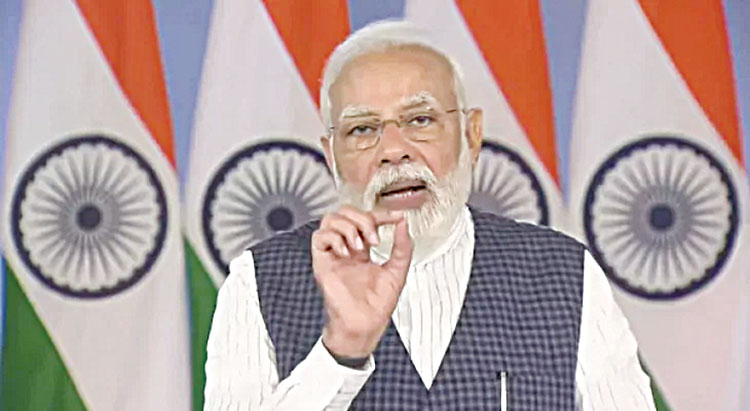New Delhi, Feb 23 (Agency) Prime Minister Narendra Modi on Wednesday asked officials and stakeholders entrusted with rural development scheme of the central government to ensure optimum utilisation of each and every penny planned for betterment of rural India. Addressing an webinar on Positive Impact of Union Budget 2022 on rural development, Modi said: “Mahatma Gandhi once said the soul of India lives in its villages, and it should be our responsibility to fulfil this vision with new energy, new strategies and new hope to uplift rural India. “As we celebrate Azadi Ka Amrit Mahotsav, we need to take the leadership and responsibility for the development of our villages. We need to ensure that every penny of the budget is utilised optimally,” he said. He said, “Sabka Saath, Sabka Vikas, Sabka Vishwas and Sabka Prayas” have been the inspiration behind every policy and actions taken by his government.
“In this year’s Budget, a clear roadmap has been given by the government to achieve the larger goal of saturation. “PM Awas Yojana, Rural Road Scheme, Water Life Mission, Connectivity of the North East, Broadband connectivity of villages… necessary provisions have been made for every such scheme in the Budget,” he said. Modi said the Vibrant Village Programme announced in the Budget is very important for the development of border villages. “The PM development initiative for Northeast region, will ensure 100 per cent implementation of programs in time-bound manner,” he said. He said that the government has set a target of ensuring 4 crore connections under the Jal Jeevan Mission and in order to achieve this target, everyone should do a lot of hard work.
“I also urge upon every state government that we need to pay a lot of attention to the quality of the pipelines that are being laid,” he said to the participants. “Demarcation of property is important. Swamitva Yojana is helping in this. “Over 40 lakh property cards have been issued. For registration of land record, a universal system and unique ID will be a big achievement,” he added. “We intend to have more active participation of people in rural areas to improve governance by removing silos, convergence and discussions to improve and fast track the schemes,… their implementation plans to benefit the citizens,” he said. He said that one of the fundamental features of India’s rural economy is women’s power. “Financial inclusion has ensured greater participation of women in economic decisions in families. This participation of women needs to be further expanded through self help groups,” he said. The PM said that digital connectivity of villages has no longer remained an aspiration, but it has become a need today. Broadband connectivity will not only provide facilities in villages, it will also help in creating a large pool of skilled youth in villages, he said.
“This year’s budget has allocated Rs 48,000 crore to the PM Awas Yojana. Efforts are being made to achieve the target of building 80 lakh homes,” he said. He urged the stakeholders to build a new image of rural India by educating the people in villages about new schemes of the government, new age technologies for farmers and new methods of farming among others. A total of 10 ministries and departments, including Ministry of Rural Development, Ministry of Panchayati Raj, Ministry of Housing and Urban Affairs, Ministry of Development of North Eastern Region, Department of Drinking Water and Sanitation and Department of Border Management and others, in addition to government officials, industry experts and representatives of various government bodies took part in the webinar. The theme of the webinar ‘Leaving No Citizen Behind’ is aimed at bringing industry leaders, policymakers and government officials together to identify actionable strategies to collectively work towards furthering the common goal of upliftment of everyone, a saturation of each household and village, leaving no one behind, the Centre said. The conclusions from the webinar will be presented to various Ministries so that they may tweak their strategies for better implementation of the government programmes.

